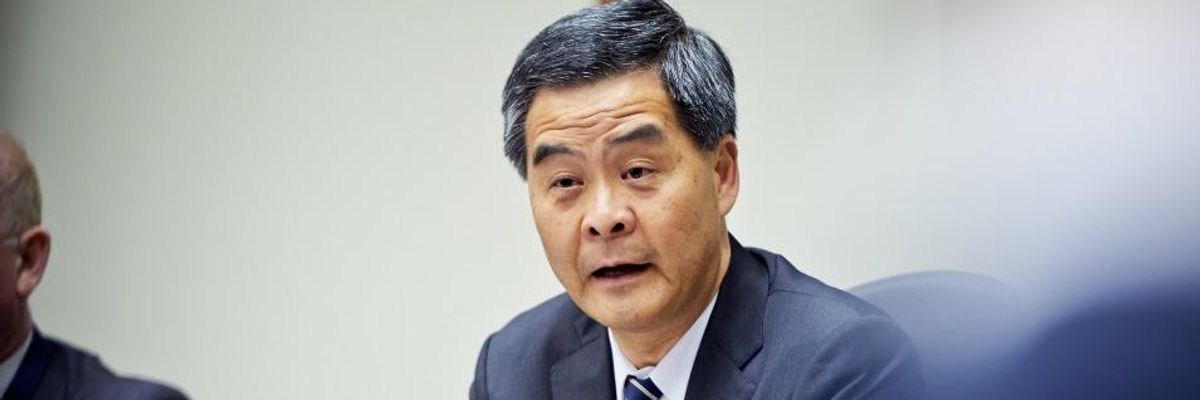As talks between Hong Kong protesters and the Chinese government began on Tuesday, the region's current chief executive C.Y. Leung spoke out against free elections on the grounds that it would empower the poor.
In his first interview with foreign media since the pro-democracy movement began, Leung said that if the public were allowed to nominate any candidate of their choosing, elections would be dominated by the large sector of Hong Kong residents currently living in poverty.
"You have to take care of all the sectors in Hong Kong as much as you can, and if it's entirely a numbers game and numeric representation, then obviously you would be talking to half of the people in Hong Kong who earn less than $1,800 a month," Leung said. "Then you would end up with that kind of politics and policies."
Roughly 1.3 million Hong Kong residents--one-fifth of its population--live in poverty, according to government statistics released last year. A four-person household earning less than $1,800 a month is considered poor.
Protesters have been staging mass rallies and sit-ins throughout the region for weeks, blocking intersections and occupying central business and government districts, to call for universal suffrage in their upcoming 2017 elections. Among their demands: C.Y. Leung's resignation.
Leung, who previously refused to consider a dialogue with protesters, telling them on October 12 that they have "almost zero chance" at achieving true democracy for Hong Kong, announced last week that he was willing to open up talks with the movement's leaders.
On Monday, he said that the government would "like to listen to the students as to what they have on their minds, and what their proposals are."
"We are all ears," he added.
The New York Timesreports:
Mr. Leung said he has tried to avoid letting standoffs between the protesters and the police escalate into anything that might echo the Tiananmen Square crackdown in Beijing in 1989. Protesters have accused the Hong Kong police of using excessive force in beating them back with pepper spray and batons. Mr. Leung said that he hoped the "dialogue" scheduled for Tuesday between student leaders and five of his top aides would help ease tensions.
Protesters remained unconvinced by Leung's request for compromise, which came shortly before government officials held their first talks with the movement's leaders. On Tuesday, tens of thousands gathered in Admiralty, Causeway Bay, and Mong Kok, three of the central protest sites, to watch the televised negotiations, which the South China Morning Post notes were the "first face-to-face dialogue between top officials and activists in the city's history."
Chief Secretary Carrie Lam Cheng Yuet-ngor said the government would submit a report to the State Council's Hong Kong and Macau Affairs Office to "reflect what had happened in Hong Kong and the concerns of different sectors" since the protests began.
But Lester Shum, deputy secretary general of the Hong Kong Federation of Students, a main organizing group of the movement, said Lam's request to end the protests was unreasonable.
"Have we not made enough concessions? So many young people ... are even willing to be arrested and go to jail," Shum said. "What do we want? The right to vote and the right to stand in elections. Now the government is only telling us to pack up and go home."

